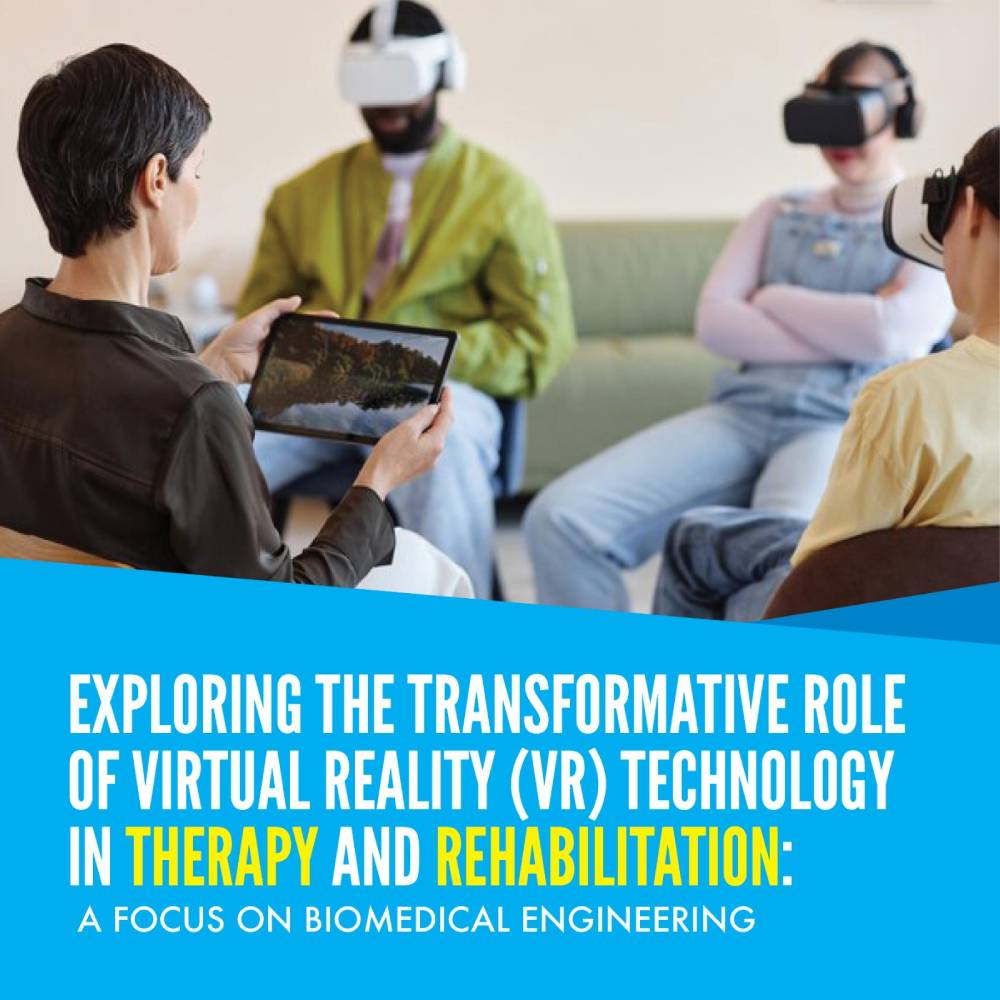
Exploring the Transformative Role of Virtual Reality (VR) Technology in Therapy and Rehabilitation: A Focus on Biomedical Engineering
Virtual Reality (VR) technology has emerged as a groundbreaking innovation, revolutionizing various fields, including healthcare and rehabilitation. In the realm of Biomedical Engineering, the study of VR technology’s application in therapy and rehabilitation holds immense promise. This article delves into the transformative potential of VR solutions, focusing on their integration within the curriculum of Biomedical Engineering.
-
Understanding VR Technology:
Virtual Reality refers to the creation of a simulated environment, often presented through a headset, where users can interact with 3D visuals and experiences. In the context of therapy and rehabilitation, VR technology provides an immersive platform for patients to engage in therapeutic exercises and simulations.
-
VR in Physical Rehabilitation:
In the field of Biomedical Engineering, students explore how VR is utilized in physical rehabilitation. VR simulations enable patients to perform exercises in a controlled, virtual environment, enhancing motor skills and coordination. For example, stroke survivors can practice movements in a VR setting, aiding in their recovery process.
-
Cognitive Therapy and VR:
VR technology also plays a crucial role in cognitive therapy. Patients with neurological disorders, such as traumatic brain injuries or PTSD, can benefit from VR-based exposure therapy. By simulating triggering situations in a controlled setting, patients can confront and manage their fears, leading to effective therapeutic outcomes.
-
Pain Management Through VR:
Studies have shown that VR experiences can distract patients from pain, reducing the need for heavy medication during certain medical procedures. Biomedical Engineering students delve into the development of VR applications that provide immersive experiences, diverting patients’ attention and contributing to a more comfortable medical experience.
-
VR in Motor Skill Rehabilitation:
Individuals recovering from accidents or surgeries often require motor skill rehabilitation. VR technology offers tailored exercises and games that target specific movements. Biomedical Engineering students learn to design VR programs that assist patients in rebuilding their motor skills effectively.
-
VR for Psychological Support:
Beyond physical rehabilitation, VR is also employed for psychological support. Biomedical Engineering enthusiasts explore the creation of VR environments that promote relaxation, meditation, and stress reduction. These applications aid in mental well-being and contribute significantly to patients’ overall recovery journey.
The integration of Virtual Reality technology in therapy and rehabilitation represents a pivotal advancement in the field of Biomedical Engineering. As students delve into this innovative domain, they pave the way for the future of healthcare. By harnessing the potential of VR, biomedical engineers contribute to enhancing patient outcomes, ensuring a holistic approach to healthcare and rehabilitation. The immersive and interactive nature of VR not only accelerates recovery but also provides patients with a renewed sense of hope and confidence as they navigate their path toward wellness. (Vid/DM)
Are you passionate about Biomedical Engineering?
If you are eager to enhance your understanding of Biomedical Engineering, this knowledge can pave the way for a fulfilling career as an engineer. Embark on your educational journey at Swiss German University (SGU).
At SGU, students studying Biomedical Engineering will receive comprehensive training and preparation. Upon completion of the program, students have the opportunity to obtain professional certifications tailored to their interests and career goals. These certifications not only broaden their expertise but also facilitate a seamless transition into the job market. Graduates holding a bachelor’s degree in biomedical engineering from SGU are well-equipped to explore diverse and global employment opportunities. In the realm of technopreneurship, innovation plays a pivotal role in achieving success, and our program is designed to nurture innovative thinking.
Discover our detailed curriculum by clicking the button below. If you are keen on learning more about Biomedical Engineering at SGU, don’t hesitate to reach out to our consultants. Your journey to a rewarding career in Biomedical Engineering starts here.
Tentang SGU
SWISS GERMAN UNIVERSITY (SGU) is an international university in Indonesia, was established in 2000 as a joint effort between Indonesia, Germany, Switzerland, and Austria. We are the pioneer in offering international curricula in Indonesia. Qualified students can graduate with a Double Degree from Indonesia and Germany, which SGU provides in cooperation with partner universities; surely a valuable tool for your future careers. Ever since its establishment, SGU has been dedicated to delivering quality education in line with international standards and aims to develop skilled professionals who meet the demands of the industry. In order to achieve its objectives, SGU offers quality-oriented learning through 14 Bachelor’s Degree Programs and 6 Master’s Degree Programs ranging from Engineering, Information Technology, and Business to Life Sciences and Social Sciences. Furthermore, with small class sizes, and with English as the medium of instruction, you can look forward to pursuing your tertiary education and degree with full confidence.


